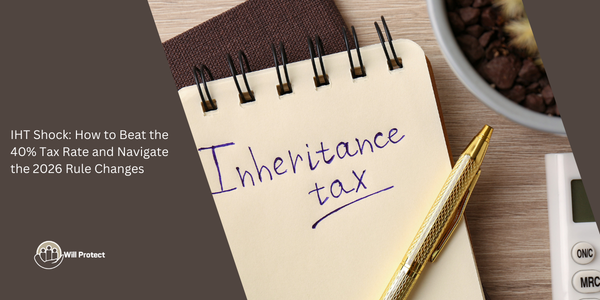Trusts and inheritance tax have become one of the most talked-about tools in estate planning this year — and for good reason. With inheritance tax (IHT) bills rising and new tax rules on the way, more families are turning to trusts to protect their wealth and reduce their exposure to the 40% IHT rate.
Why Trusts Are on the Rise
A perfect storm of factors is driving this trend:
- Frozen thresholds: The £325,000 IHT allowance hasn’t increased since 2009, dragging more families into the tax net.
- Upcoming rule changes: From 2027, pension pots will lose their IHT exemption, and from 2026, business and farm reliefs will be capped at £1 million.
- Rising asset values: Growing property prices mean even modest estates now risk paying inheritance tax.
Wealth planners are reporting a surge in enquiries — with some firms seeing trust use almost double in 2024. Families are acting early to safeguard their assets before the new rules take effect.
How Trusts Help Reduce Inheritance Tax
A trust allows you to move assets out of your estate and into the care of trustees who manage them for your chosen beneficiaries. This can:
- Reduce IHT exposure: If you survive seven years after transferring assets into a trust, their value may no longer be counted in your estate.
- Protect family wealth: Assets in a trust are shielded from divorce, debt, or misuse by beneficiaries.
- Preserve control: You decide how and when beneficiaries can access the assets — ideal for protecting younger family members.
Trusts can also prevent future asset growth from being taxed and help couples use both partners’ allowances effectively.
Common Types of Trusts
- Discretionary Trusts – Flexible for families with changing needs; trustees decide how and when to distribute funds.
- Life Interest Trusts – Provide income for a spouse during their lifetime, with capital passing to children later.
- Lifestyle Trusts – Allow you to gift assets while retaining the option to draw a modest income if needed.
Why Act Now
With major inheritance tax reforms coming in 2026–2027, and likely changes in the Autumn Budget, acting early could save your family thousands. Setting up a trust under current rules may protect assets from the future inclusion of pensions and capped reliefs — provided you survive the seven-year period.
Get Expert Advice
Trusts and inheritance tax are powerful but complex. The right solution depends on your assets, family structure, and long-term goals. A professional estate planner can help you create a trust that’s tax-efficient, compliant, and tailored to your needs.
And Finally…
Trusts and inheritance tax are becoming the go-to strategy for UK families who want to protect family wealth and stay ahead of inheritance tax changes. With expert guidance, you can reduce your IHT bill, secure your estate, and ensure more of your legacy goes to the people you love — not the taxman.
FAQs: Trusts and Inheritance Tax Planning in 2025
Trusts are increasingly popular because inheritance tax (IHT) thresholds have been frozen, and new tax rules will soon bring more estates into scope. From 2027, pension pots will no longer be exempt from IHT, and from 2026, business and farm reliefs will be capped. Many families are using trusts now to protect assets before these changes take effect.
When you place assets into a trust and survive for seven years, their value may no longer count towards your estate for inheritance tax purposes. Trusts can also remove future asset growth from your taxable estate and help you make better use of allowances, potentially saving up to 40% in IHT.
- Discretionary Trusts: Offer flexibility for changing family needs and protect assets for future generations.
- Life Interest Trusts: Allow a spouse to receive income or use property for life, with capital passing to children later.
- Lifestyle Trusts: Let you gift assets while retaining access to a small annual income if needed.
Under HMRC’s seven-year rule, if you gift assets (including those placed in a trust) and live for seven years after doing so, those assets are usually excluded from your estate for inheritance tax. Planning early is key — the sooner you act, the sooner the seven-year clock starts.
That depends on the type of trust. Some, like Lifestyle Trusts, allow you to withdraw a fixed percentage of income each year. Others, such as discretionary trusts, transfer control entirely to the trustees. The best approach depends on your personal financial situation and goals.
No. With rising property prices and frozen tax thresholds, many middle-income families now face inheritance tax bills. Trusts are increasingly being used by ordinary families to protect homes, savings, and investments from unnecessary tax.
Trusts come with legal and administrative responsibilities, and certain types may face small periodic tax charges. However, these costs are usually far lower than the 40% IHT rate that could apply without planning. A professional estate planner can explain which option is most suitable and cost-effective for your circumstances.
If you’re thinking about inheritance tax planning, the best time to act is now. With rule changes coming in 2026 and 2027, setting up a trust under current rules could help secure valuable tax benefits and protect your estate from future IHT exposure.
Yes. Trusts are powerful but complex. Getting expert guidance ensures your trust is structured correctly, compliant with HMRC rules, and aligned with your estate planning goals. A professional adviser can also integrate your trust with your will and other financial plans
Will Protect specialises in estate planning, wills, and trusts for UK families. Our expert team can help you choose the right trust structure, minimise inheritance tax, and ensure your assets are protected for future generations.




